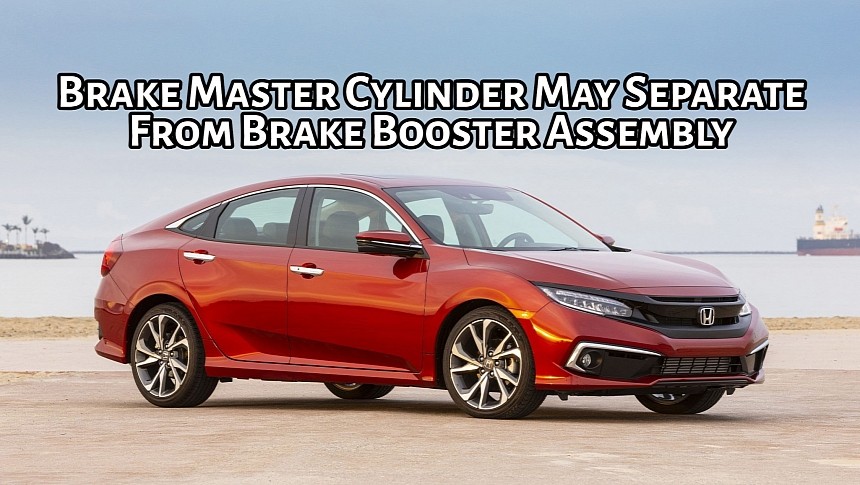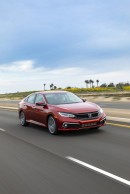Honda may have a better reliability record than the Big Three automakers in Detroit, but still, mistakes can be made. Rather than Honda, an Ohio-based supplier by the name of Veoneer Brake Systems took responsibility for recall number 23V-458, which we'll cover in this story.
It all started in December 2020, when Honda's manufacturing division found that a nut was missing from the brake booster assembly tie rods of a vehicle produced for the US market. Veoneer Brake Systems implemented countermeasures, but alas, the folks at VBS didn’t implement good enough measures.
Come December 2022, two years after the first incident, Honda received a report alleging a brake failure in a 2021 model year Pilot. For some reason or another, both Honda and Veoneer Brake Systems dragged their feet until June 2023. Both parties eventually agreed that a recall must be issued over the potential separation of the brake master cylinder from the brake booster assembly.
From diminished to a complete loss of brake function, this defect increases the risk of a crash. Separation is caused by loose or missing tie rod nuts. The bending load occurring upon the brake booster assembly's tie rod studs may break said components, therefore resulting in a noncompliance with federal motor vehicle safety standard number 135 for light vehicle brake systems.
Published by the National Highway Traffic Safety Administration in late June 2023, the report attached below lists no fewer than 124,077 potentially affected vehicles, of which 1 percent are believed to exhibit said issue. Affected vehicle range from the 2020 to 2021 model year Civic to the 2021 to 2023 Passport, 2021 to 2022 Pilot, 2020 to 2023 Ridgeline, and 2020 Acura MDX.
Their production dates are October 2020 through March 2023. The easiest way of telling whether your vehicle is recalled or not is by running the VIN on the NHTSA's website. Dealers have been instructed to inspect and replace the missing nuts and – if necessary – damaged brake booster assembly components. Owners will be informed of VBS' blunder on or about August 7, 2023.
At press time, the Civic is available to configure as a 2023 model in sedan, hatchback, and Type R forms. Pricing for these versions kicks off at $23,750, $24,750, and an eye-watering $43,795 (sans freight).
Given the plethora of reports on Civic forums and groups on market adjustments from greedy dealers, you'll probably won't find a CTR at MSRP anytime soon. The Ridgeline pickup, Passport two-row crossover, and Pilot three-row crossover are all based on the same platform. In the order of pricing, these midsizers currently retail at $36,300 for the Pilot, $38,800 for the Ridgeline, and $41,100 for the Passport.
Essentially a Pilot with a nicer exterior and interior, the Acura MDX entered its fourth generation in 2021 for the 2022 model year with either a naturally-aspirated V6 or a turbocharged V6. The lesser engine is $49,550 at the moment of reporting, whereas the Type S-specific turbocharged V6 can be yours for a cool $67,850.
Come December 2022, two years after the first incident, Honda received a report alleging a brake failure in a 2021 model year Pilot. For some reason or another, both Honda and Veoneer Brake Systems dragged their feet until June 2023. Both parties eventually agreed that a recall must be issued over the potential separation of the brake master cylinder from the brake booster assembly.
From diminished to a complete loss of brake function, this defect increases the risk of a crash. Separation is caused by loose or missing tie rod nuts. The bending load occurring upon the brake booster assembly's tie rod studs may break said components, therefore resulting in a noncompliance with federal motor vehicle safety standard number 135 for light vehicle brake systems.
Published by the National Highway Traffic Safety Administration in late June 2023, the report attached below lists no fewer than 124,077 potentially affected vehicles, of which 1 percent are believed to exhibit said issue. Affected vehicle range from the 2020 to 2021 model year Civic to the 2021 to 2023 Passport, 2021 to 2022 Pilot, 2020 to 2023 Ridgeline, and 2020 Acura MDX.
Their production dates are October 2020 through March 2023. The easiest way of telling whether your vehicle is recalled or not is by running the VIN on the NHTSA's website. Dealers have been instructed to inspect and replace the missing nuts and – if necessary – damaged brake booster assembly components. Owners will be informed of VBS' blunder on or about August 7, 2023.
At press time, the Civic is available to configure as a 2023 model in sedan, hatchback, and Type R forms. Pricing for these versions kicks off at $23,750, $24,750, and an eye-watering $43,795 (sans freight).
Given the plethora of reports on Civic forums and groups on market adjustments from greedy dealers, you'll probably won't find a CTR at MSRP anytime soon. The Ridgeline pickup, Passport two-row crossover, and Pilot three-row crossover are all based on the same platform. In the order of pricing, these midsizers currently retail at $36,300 for the Pilot, $38,800 for the Ridgeline, and $41,100 for the Passport.
Essentially a Pilot with a nicer exterior and interior, the Acura MDX entered its fourth generation in 2021 for the 2022 model year with either a naturally-aspirated V6 or a turbocharged V6. The lesser engine is $49,550 at the moment of reporting, whereas the Type S-specific turbocharged V6 can be yours for a cool $67,850.













